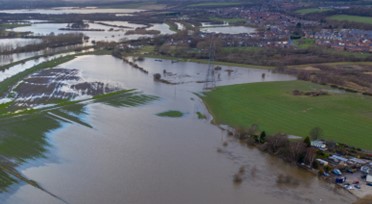International Day of Awareness of Food Loss and Waste
Friday 29th September marks the fourth year of International Day of Awareness of Food Loss and Waste. The day looks forward at the 2030 agenda for Sustainable Development, focusing on bringing a reduction to “food loss and waste (FLW) toward transforming agrifood systems”. Awareness of food loss and waste has proved to be significant recently. The UK’s temperamental summer has had an adverse impact on agricultural land producing food, as well as contributed to increased floods on farmland.
UK’s wet summer
The UK summer of 2023 has been a bit weather-mad! Coming out of June where we experienced a good period of warm weather, we then had the wettest month of July since 2009. Farmers have outlined that their soil became waterlogged, making it difficult for them to harvest their crops. Even when crops are harvested, their moisture levels need to be low enough to be sold, causing food loss but also profit loss for the industry.
Flooding through the wet weather
As shown by this year’s UK summer, food loss and waste can often come from farmland flooding. If located in a prone area to flooding, greater food loss may occur. With “60% of England’s finest agricultural land [being] at the highest risk of flooding from climate change”, flooding remains a major risk for England’s agricultural industry. This brings further importance to ensuring farmland has effective drainage strategies in place. Effective drainage would not combat all extreme flooding that farmland may face, but strategies could provide land with the best possible protection from flooding.

Drainage strategies
With the right drainage strategy in place, food loss can be reduced on farmland. Through mitigating against floods, excess water can be transported away from the land. Although, when it comes to site drainage it is necessary that the correct strategies are used to prevent water contamination. For example, a foul water drainage strategy on a farm would be useful to move water containing pesticides and fertilisers into waste water systems rather than fresh watercourses. This can then be accompanied by a separate surface water drainage strategy to ensure surface water runoff is directed to watercourses, potentially with the addition of silt traps to remove sediment and other contamination.
For this year’s International Day of Awareness of Food Loss and Waste, we should acknowledge the tough period that UK farmers have faced due to the recent wet summer. With the unexpectedly poor weather, harvest has become difficult and food loss has become more likely with the high moisture levels, ruining food. With farmland being negatively impacted by flooding, effective drainage strategies have become even more significant! For more information around drainage strategies for your site, please get in touch with Unda today and speak with our team of experts.